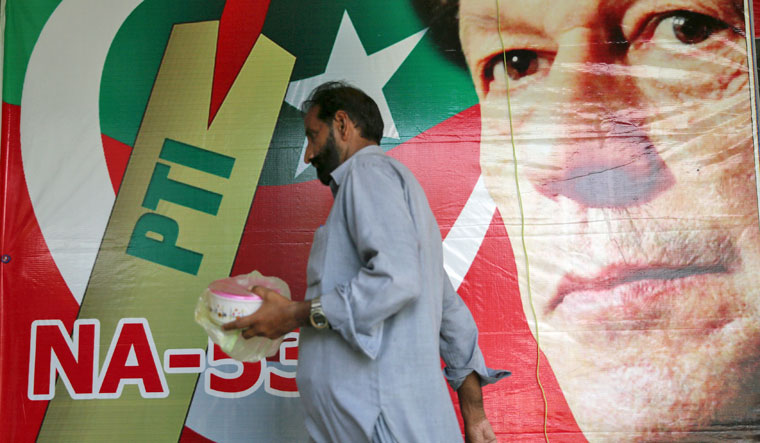Imran Khan was inching closer to form a government in Pakistan with the support of allies and independents as his Pakistan Tehreek-e-Insaf party leaders today met to discuss the next step and the future Cabinet formation.
Khan chaired a meeting of the top PTI leaders at his Bani Gala residence where he was assured by them of having the numbers to form the government.
So far his party has bagged 118 of the 270 National Assembly seats on which elections were held and was leading in another two constituencies where counting was still on.
Khan's party was followed by jailed former prime minister Nawaz Sharif's Pakistan Muslim League-Nawaz (PML-N) with 62 seats and former president Asif Ali Zardari's Pakistan Peoples Party (PPP) with 43 seats. Independent candidates have won 12 seats, according to the election commission which has so far issued results for 265 seats of the National Assembly.
Pakistan's National Assembly comprises a total of 342 members, of which 272 are directly elected. A party can only form the government if it manages to clinch 172 seats in total.
Mutahidda Majlis-e-Amal (MMA), an alliance of traditional religious parties like Jamat-i-Islami, has clinched 12 seats while Pakistan Muslim League of former Punjab chief minister Pervaiz Elahi won 5.
Karachi-based Mutahida Qaumi Movement (MQM) has won 6 seats. Senior PTI leader Jahangir Tareen made calls to MQM leaders after which the party decided not to attend a meeting of political parties called by the PML-N.
In the 342-member National Assembly, the PTI's strength will be 160 after acquiring 29 women's reserved seats and 4 or 5 reserved seats for minorities, according to experts.
Khan's ally PML-Q has won five seats and it can also have one seat reserved for women. Sheikh Rasheed of the Awami Muslim League is already supporting Khan. The PTI is in contact with MQM, which has assured its support to Khan.
Some independent winners from the tribal region are in talks with PTI and they are likely to extend their support to Khan, helping him attain the figure of 173 which is a simple majority, they said.
Some smaller Baloch parties could also support Khan.
PTI spokesman Fawad Chaudhry said that they have the required numbers to form government in center, Dunya News TV reported.
In his first speech that was broadcast live via video link yesterday, Khan had claimed victory in the elections and said that he was ready to probe allegations of rigging in the polls.
"Anyone who has issues of rigging; we will help you facilitate and we will open up any constituency that you want for investigation," Khan said, amid allegations by the six major parties, including PML-N and PPP, of foul play in the counting process.
However, PML-N supremo Nawaz Sharif reiterated his party's allegations, saying the polls had been "stolen" and the "tainted and dubious" results would cast a "bad impact" on the country's politics, according to a number of his party leaders who visited the Adiala jail in Rawalpindi to meet him.
The elections for the parliament and four provincial assemblies were held on Wednesday and the announcement of the results has been marred by delays in transportation of results from polling stations to centralised election offices.
According to media reports, the meeting at Khan's residence also discussed possible Cabinet names. Asad Umer and Shah Mehmood Qureshi were being considered for the post of finance and foreign ministers, respectively.
Senior PTI leader Shireen Mazari's name was doing the rounds for the defence minister's post, while Shafqat Mehmood was a leading contender for interior minister's job.
The results showed that in the provincial assemblies PML-N was leading in Punjab — the most populous province — with 127 seats in the house of 297, but fell short of a majority.
Khan's PTI with 123 seats is negotiating with independents, most of whom parted ways with the PML-N before the polls and contested independently.
The independents with 29 seats are the third largest group and will play a crucial role in the formation of the next government in Punjab, which has been ruled by the PML-N for the last two terms from 2008-2018.
Khan's ally PML-Q has got seven seats in the province.
In the 297-member House, 149 seats are required to form the government.
The PTI has already announced to form the government in Punjab, a move which may lead to allegations of horse trading.
In Sindh assembly, the PPP has got a clear majority by winning 74 seats in the house of 131. It is followed by PTI with 22 seats and MQM by 16.
In Khyber-Pakhtunkhwa, the PTI has won a two-thirds majority by bagging 66 seats in the assembly of 99 members, whereas MMA is the second largest party with 10 seats.
In Balochistan, the newly-formed Balochistan Awami Party (BAP) is on top with 13 seats but failed to get a majority in the House of 51 members. MMA is the second largest party with 9 seats. Balochistan National Party and independents have won five seats each while PTI received four.
PML-N chief Shehbaz Sharif has convened an All Parties Conference (APC) later today in Islamabad and PPP, MMA, MQM and several smaller parties are expected to attend it.
The election marks the second democratic transition of power in Pakistan's 70-year history. The military has ruled Pakistan through various coups for nearly half of the country's history since independence in 1947.
—PTI


